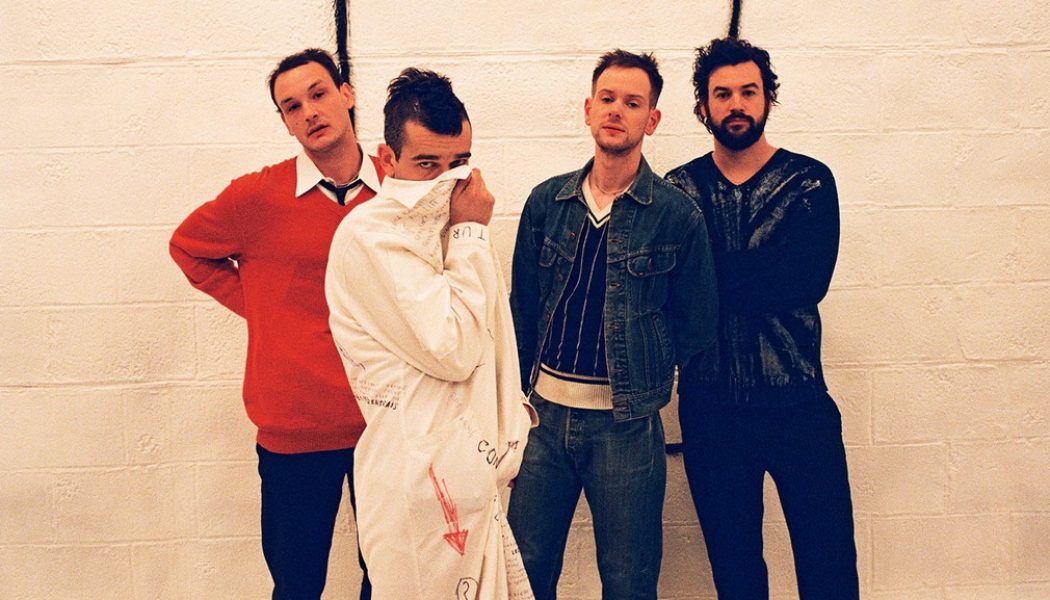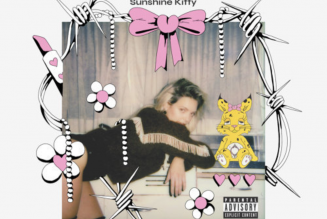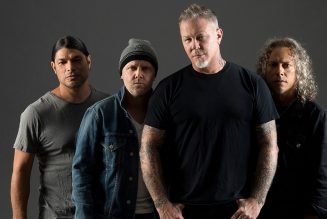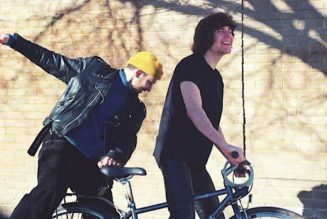
The 1975 frontman talks about the band’s sprawling fourth LP ‘Notes on a Conditional Form,’ as well as his own quarantine living, and his band’s new status as critics’ darlings entering their second decade as The 1975.
When you’re a four-piece rock band in the year 2020, it’s a hard thing to keep scaling up. But that’s what The 1975 and frontman Matty Healy have done over the course of seven years and three albums — soon to be four, with the release next Friday (May 22) of their much-anticipated new album, Notes on a Conditional Form.
While the band’s 2013 self-titled debut brought them fame (and infamy) in their home country of the U.K., and earned them a pop cult following in the U.S., 2016 sophomore set I Like It When You Sleep, For You Are So Beautiful Yet So Unaware of It made them stars on both sides of the Atlantic, topping both the U.K. charts and the Billboard 200 Albums listing. Third album A Brief Inquiry Into Online Relationships brought them somewhere new: near-unanimous critical approval, including a five-star NME review, a Brit award for British album of the year, and even the No. 1 song on Pitchfork’s 2018 year-end list for single “Love It If We Made It.”
Now, Notes on a Conditional Form looks to be their biggest album yet — and it certainly is, at least in terms of size and scope. At 22 tracks and over 80 minutes, it’s their longest and widest-reaching album, freely flowing between its many disparate tracks. Confrontational punk screeds like lead single “People” collide with delicate acoustic ballads like queer love song (and Phoebe Bridgers duet) “Jesus Christ God 2005 Bless America” and slick pop-rock like the just-released intra-band devotional “Guys,” as orchestral instrumentals and ambient electronic explorations provide the set’s connective tissue. Healy also released a series of podcasts through U.K. magazine The Face, in which he interviews a number of his musical heroes — including Stevie Nicks, Brian Eno, Bobby Gillespie of Primal Scream and Kim Gordon of Sonic Youth — about their musical histories and processes, and where his own band fits in relationship to them.
The early returns are good: their conflicted, ’80s-indebted ode to Internet romance, “If You’re Too Shy (Let Me Know),” has become their highest-peaking single on the U.K. charts with its No. 14 debut — also tying their No. 5 high-water mark on Billboard‘s Rock Songs listing — and Notes scored the band a second-straight perfect rating from the NME.
“I feel like now, we are one of — if not the — definitive band of that whole [last] decade,” Healy says of his band’s status going into their fourth record. “I would say that Radiohead were the band of the ‘90s, and they went on to make my favorite records outside of that decade, you know what I mean? So I’m gonna just continue to operate, I’m not gonna rest on my laurels.”
Talking to Billboard from the English countryside, where he’s currently holed up and making new music with 1975 co-architect George Daniel — “We’ve [already] been quarantined with each other for a decade,” he jokes — Healy talks in depth about his band’s latest effort, as well as some of the more telling moments from his podcast series, and what it’s like to be releasing a potentially defining album while the larger world is in a state of perpetual crisis. (The conversation has been condensed and edited for clarity.)
In some early reviews of the album, people have already latched onto how a couple of the songs talk about your push-pull relationship with going outside and staying inside. I didn’t really realize it until this lockdown, but it’s sort of been a recurring theme in lyrics of yours throughout your career, in songs like “Love Me” or “Give Yourself a Try.” Is that something you’ve been aware of? Do you think of it differently now in quarantine?
I think I’ve always dealt with social anxiety — met with performing for a job — as a kind of paradox in my life. It’s not like I’m like socially anxious, it’s just that I will choose to not [go out] most of the time. You know, once I’m there, I’m normally fine.
It’s that feeling of being inside one’s mind as well, and my emotions and reactions being part of a thought process that might be fractured in its essence. I think I’m always paying tribute to the idea of like, “This is what I think, but I don’t even know if I think right,” do you know what I mean?
Is there a kind of comfort to that choice being taken away from you in this quarantine period? A certain calmness to not having to make the deliberation of what you want to go out into the world and be and do?
I don’t know. I think that I’m kind of — I’m not literally scared of going outside. I just feel that now, I’m more conscious of like… the cultivation of my own world, as opposed to the constant desire to curate the wider world. You know, politics starts at home, and it’s not that I don’t stand for the same ideas at home that I do in public, it’s just that I feel like I spend a lot of my time trying to change the world. And maybe I should change more time trying to change my world, and trying to curate my world, maintain my relationships, that kind of thing.
[embedded content]
Is there anything that excites you about the idea of releasing an album under quarantine?
I like the idea that it’s kind of solidified my desire to only really have longform expressions. Like, even over the past year, my social media or my presence outside of my records — which is not really that much, because it’s all aligned with my records — my presence outside my records has become a lot more like about [either] information, or like, a joke. Outside of that, opinions are kind of left for my records, or conversations in longform.
So I suppose these podcasts and the records… I don’t want to do anything self-interested, because I’m not that self-interested anymore. So I think the record is not self-interested. The podcasts I’ve been doing aren’t that self-interested. And the idea of like: I like that I’ve been working towards making an environment for myself where I can just kind of have longform expressions, and be happy with that. And I’ve kind of got there now.
So you would consider Notes on a Conditional Form to not be a self-interested record? I’m curious how you quantify that.
Well, I don’t mean it’s not a self-indulgent record. But it doesn’t have a lot of ego. And it doesn’t discuss a lot of ego. And if it does, it’s more kind of a deconstruction of that, like. I suppose it’s indulgent in the way that we don’t really care that much, and it’s this long, f–king meandering thing… it’s just not particularly self-aware, that’s the thing. It’s not posturing or trying to be something, or trying to construct an opinion about what it is, d’you know what I mean? It’s a very free record, and it has a lot of humility.
You know, I’m not dealing with the same things I was dealing with on [my earlier records]. You mentioned “Love Me,” for example — that’s very much about my ego and how I’m negotiating it, and how it’s manifesting in pop culture as a kind of exaggerated version of what it actually is. Those ideas just aren’t really that present in my work now.
Five years ago, you said that the way you measure The 1975 and how successful the band is, is touring — fan response at shows and ticket sales. So when you release a new album and touring is still probably a ways off, how do you measure how well the album is doing, and whether it’s taking you to where you want to be in your career?
I suppose I was talking [at the time] in the context of the fact that we’d become like a very, very big band, but we were still a very, very, like, cult band. And we still kind of are. I just think that — I still had my mind blown that we could sell out those kinds of rooms. I didn’t spend a lot of time listening to the radio, I didn’t spend a lot of time doing this and that. So that was kind of how I quantified it at the time.
So I think that now, where it’s slightly different, is I see our reach in different places. I see our kind of influence in different places. I think that this record suits coming out now, to be honest. It makes sense a bit, it feels kinda justified almost, the sort of things that I’m talking about.
[embedded content]
Did you see that “If You’re Too Shy (Let Me Know)” has become your biggest chart hit?
Oh, is that right? Where, in like America or something?
No, in the U.K. It debuted at No. 14. Beat “The Sound” by one spot.
Oh, did it, right? OK. I don’t know. With my label, I do pay attention to quite a lot of [this type of] stuff — I don’t want to plead ignorance and be like, cute and dumb, “Oh, I don’t know!” [Fakes giggle.] No, I kind of know… but like, if I paid attention to the metric s–t of The 1975, then I would just be f–king stressed. I’d be not my vibe.
It’s funny, because it’s like, when it’s other artists, I kind of operate like a professional… I don’t take liberties or any of that kind of s–t. But when it comes to my band, I still act like a f–king 18-year-old, you know what I mean? [Obnoxious teenager voice] “I don’t wanna do that, this is dumb!” I get that out in my band. So if I started worrying about the hits…
And — who gives a f–k? I didn’t even want to put “Too Shy” out. Don’t ask me. I don’t f–king know.
How do you mean by that? You didn’t think it was a single?
I just always have to let myself be a little bit childish. Because like, I know that people are gonna love that song. And I know that it’s a good single, all these kinds of things. But to be honest with you [when it comes to singles], I need to be really emotionally led. I do actually know what a good single is, I know that “Too Shy” is a good song, I just think that in these times, I realize that people do need music like that — whereas I feel like the music I want to put out is quite hard-edged. But that’s just not what… life’s more than that.
Do you feel like songs like “Too Shy” give you the capital to release songs like “People”? Obviously, “People” probably wasn’t destined to be a huge chart hit, but does having a song like “Too Shy” in reserve give you the pull with your fans and decision-makers to say, “Let me put out this single I want to put out first, and eventually we’ll get to the ‘Too Shy”s later”?
I mean to be honest with you, no. Because it was when it was finished, honestly. I mean, “Too Shy” took a while, and it came later. And to be fair, we did know, “Oh, it’d be good to have going into the album’s release.” Because to be fair, what really happens, is we always write one of those songs like every f–king year — like every album, we write “The Sound,” or “It’s Not Living (If It’s Not With You),” like a quintessential 1975 [hit]… I just think that that’s a very big part of our DNA. And I think that that just comes out when we’re having fun.
Then I’ll be a bit like, “We shouldn’t be having fun! The world’s on fire!” But you know, maybe we should be having fun.
[embedded content]
How early in the process do you know this was going to be your longest, biggest album?
Well, we don’t really sit around and talk about exactly why this song should stay around or whatever. It’s just about the excitement that it gets us. And then we would basically listen to the playlist, and we’d kind of put it on shuffle on “recent songs” or whatever it is, and you let it play. And then you kind of like take off stuff that you don’t like. And then by the time we did that three times, we always ended up with the same 22 tracks. So, that kind of answered itself, you know?
Is there ever a thought that someday The 1975 will make their version of The Strokes’ Is This It? You know, just 11 songs, 37 minutes, one sonic standard, and just kind of nail that?
Very much so! Yeah, it’s funny that you say that. I suppose that I always want to challenge myself as an artist. And I haven’t really thought about the form until now, because I just make albums, and I make albums in the way that I want to make them. And I suppose that maybe that is a challenge for me. I hadn’t really thought about that, but maybe making a record that is this linear, [Talk Talk’s] Spirit of Eden, or Hats by Blue Nile… Yeah, I think that that would be challenging. I’d like to make a record like that.
You’d previously talked about you and George making a record that was entirely electronic. Have you just become more comfortable with integrating that part of your output into The 1975’s more band-type albums, or is that still something you’re thinking about down the line?
I mean, I think that it has been partly that we realized that our identity as The 1975 is actually really far-reaching. So we don’t need to kind of worry about it that much. But I think that an ambient record will be in the cards at some point in our career, just because that’s the kind of music that we listen to, you know?
[embedded content]
I wanted to ask about some of the themes regarding your sexuality on the record — which is a discussion that you’ve gotten some backlash for in the past, some quotes of yours maybe being taken out of context. Is that something you still wanted to make a point of diving into, even knowing that you might get a lot of questions about it?
I mean, “Me & You Together Song” is kind of like a character-based thing. So I’m not really concerned about that raising questions of my sexuality. I think that I’ve always kind of been like quite straight and camp, and thought that that was quite obvious… I think people have had a desire for my sexuality to be way more interesting to me than it is. And the things that I’ve kind of commented on have been about the external perspective, and why maybe I’m confused about that.
But on a song like “Jesus Christ,” you’re singing pretty straightforwardly about a male-male love story. I don’t know if that’s also considered character playing, or…
Oh, that… well, yeah, I suppose so. I mean, it’s slightly coincidental — maybe it’s something that’s kind of going on that’s Freudian in my mind, I don’t know what’s happening. [Laughs.] But I just think that with that song, the way that that song actually came about is that it was the same song musically, but two different songs lyrically. So it was like… one version was about kind of the prison industrial complex, and one version was about religious oppression on middle-American youth. That’s essentially what the two versions were about. And then afterwards, I kind of cut them up and kind of made one song out of it.
And so it’s kind of interpretive and kind of interesting, so that line comes from a kind of place of like… sad loneliness, and remorse for being one’s self in a place where you kind of can’t do that. And I think that’s an idea that’s kind of quite international.
Were you surprised that people latched onto the Pinegrove lyric in “The Birthday Party” the way that they did?
Well, you know what? You’re like the third journalist to mention that, and…
Well, it’s a lyric tailor-made for journalists to ask you questions about.
Oh, this is the whole thing! It’s like, I’m not very much on Twitter anymore, and I don’t know where a lot of these discussions happen. But I see that the music journalist world is quite Twitter-y. And there’s a lot of people I follow and stuff like that. But the fact that it was such a discussion among journalists has only been brought to my attention kind of now, when people have been saying that. I don’t actually know what people were saying.
For me, I thought that it was quite obviously like, a line about a time. And people now knowing what to do, basically. It was kind of about everyone like my age, you know, 28-32 or whatever, in the indie rock scene, and not knowing what the f–k was up, you know what I mean? Again, like every 1975 song ever, it doesn’t express an opinion. Like, none of my lyrics express opinions really, unless they’re about myself. “Love It If We Made It” — I’d never be able to make records like A Brief Inquiry if I was going, “You’re wrong, this guy’s an a–hole…” I just ask questions. I just like to point out what I see around me.
I even spoke to Evan [Stephens Hall, Pinegrove frontman] about that line beforehand, and he was kind of cool and quite interested in the song. But still, I don’t know what people are saying. I suppose it’s interesting that I’d reference that, but of course I’d reference that! It was like a massive thing that was going on at the time.
[embedded content]
How do you feel about The 1975 being more involved in the critical discussion, and being more critically approved, than you were on your first two records? Is that discomfiting to you at all? Does having universal acclaim change your relationship with the music that you’re making?
It probably would have, in the beginning. But the fact that it didn’t happen probably means that we get to be the band that we are now. It’s hard to to take s–t, you know what I mean? I mean it’s not hard, but you’ve got to really believe in yourself if you make a statement and then people are like, “Nah, f–k that.” You either chase that approval, or you think, “F–k you, you literally don’t know what you’re talking about!” And walk off into the distance kind of laughing. And that’s kind of what we did.
But honestly, it’s all nice. It’s like a nice photo shoot, or nice car from the airport. It’s like, “This is cool!” But I don’t really f–king care. Because if I cared, then I wouldn’t be able to make records.
Is there a part of you that almost misses being more divisive critically? That thinks maybe you’re doing something right when not everybody agrees that what you’re doing is good?
Oh, people still don’t like us, for sure. But to be honest with you… I think that we’re a really f–king dope band! So I’d be suspicious if, like, everyone hated us. It’d be like, “You guys are wrong! We’re a f–king dope band.”
I suppose I like [critical approval] because I like culture. And I like reading Pitchfork — I would read Pitchfork about other people and stuff like that.
I want to know everything there is to know about “Guys.” What was the moment that inspired it?
I can’t really remember. It happened really naturally, I think. I don’t know why, I just had that [sings] “It was the best thing that ever happened” thing going — and I was thinking, “What was that?” And I was thinking, well, this. Starting this band. And I realized that like a lot of love songs are kinda written from the perspective of our romantic relationships being like, the formative relationships in our life. And I think a lot of our relationships are our platonic, our friendships are things that we should pay tribute to. Because we don’t really pay tribute to it that much, like, in art, you know?
What did the guys have to say about it when they heard it?
I mean, you know. We’re all quite soft guys, but we’re all guys at the end of the day. So it was very much, like, “Oh that’s nice.” We didn’t all stand around and every time it was on, because we had to finish it, you know?
[embedded content]
Are you worried about there ever being a time when you’re playing the song onstage, and you’ve just had a fight backstage — y’know, Adam’s glaring at you, and you’re kinda pissed at George — will it be strange to still have to play this incredibly sentimental love song about the three people you’re on stage with when you don’t always feel that way in the moment?
I mean, I think we’re coming up to like 18 years together now — it’s the same lineup. So if we were [always fighting], we wouldn’t have been able to get to the point where we’d want to write one of those songs, d’you know what I mean? So I think that now, we’re not going to be like that. We’re not like that — we’re like a family. And maybe I’d sound naive [in the song] if we’d only been around for like five years. But we’re closer to like 20, honestly. So we know what’s up. We know what’s important. We know who we are. There’s gonna be no fighting each other backstage, I’ll tell you that much.
I did want to ask about the podcasts from last week. So out of the seven — obviously, those are all legends, and personal heroes of yours — which one actually made you the most nervous before they picked up the phone?
Kim Gordon. I don’t know why, I think the kind of teenager in me came out. Connor [Oberst] is a friend of mine, Mike [Kinsella], we’ve kind of spoken before, Brian [Eno] we’ve met and we’ve had one of those conversations before. And I’d heard that Stevie [Nicks] was a big fan. With Kim, she still seems like the kind of cool kid. She was really sweet, she was like a nice lady, she’s really lovely. And she’s not like a pretentious hipster. Which is not what I thought. But I was just so intimidated by how f–king cool she is. It’s not that I didn’t think everyone else was super-cool, those are literally all of my biggest heroes.
Was there anyone that you were hoping to get in touch with for the series, but who didn’t come through at the last second?
Ah, there was some people who gave us like a really, really nice “No.” Harriet Wheeler from The Sundays. It was very hard to track her down, and I managed, and she sent me this beautiful email, just saying she’s really not doing that kind of thing — especially not right now. But she’s so thankful and she loves our music and all this kind of stuff, so I was really touched by that. And [The Streets’] Mike Skinner, who’s like my mate. He was the only one who didn’t do it! [Laughs.] We got like a hard “No” from Mike. I wanted to ring him and be like, “Mike, what the f–k are you doing?!” He’s just not interested in talking about himself.
In your interview with Bobby Gillespie, he talked about how now that he’s getting older, there are artists who are singing about young people stuff and he just doesn’t have an interest in it. You’re only 31, but is there already music that you hear and think “OK, I’m already too old for this?”
Not music. To be honest with you, I only really consume stuff that I find interesting because it’s really new. So that’s why I’m kind of looking for stuff, so I’m always looking into the weird, esoteric and young. One of the things is that song “Death Bed” — there’s a song [by Powfu] with a sample from beabadoobee, who’s on our Dirty Hit label — a huge hit now. And I’ve been monitoring that as one of the creative drivers of our label, I’ve been monitoring that on TikTok, which is one of the big drivers of what’s discovered now.
And then half the content on TikTok I feel is not appropriate for me. Like, that I shouldn’t be watching that s–t — it just feels like teenagers sexualizing themselves, and I just feel like a f–king pedophile… I don’t need to be involved in that s–t.
It seems like the two people you talked to who are closest to the two poles of your artistic identity are Brian Eno and Stevie Nicks. And they both gave you some really nice compliments: Eno saying that “Love It If We Made It” was the kind of political song he wished he could write, and Nicks reading the lyrics to “She’s American” back to you as poetry. I’ve been interested recently in the idea of imposter syndrome, which some of the smartest, most talented people I know suffer from. I’m curious, when you have your absolute idols saying these incredible things to you about your songs, is your first reaction, “Yes! I always knew I was good!” or is it “Oh, I guess I fooled them too”?
Ummm… [blows lips]. I completely understand the idea of imposter syndrome. But it’s active with me when I’m trying to create. I don’t know if I look back at my old stuff and be like, “That was all a trick.” Imposter syndrome works more like, well, you had something then that you don’t have now. You had a vibe that you don’t have… that was because you were f–king young… you know what I mean? I’m never really looking back at my stuff and devaluing it.
It’s more to do with looking at a f–king piano and going, “I can’t play the piano! What the f–k am I doing! Who am I f–king kidding?” Like I was saying to Stevie, you look at these virtuoso players and you think like, “I can’t do that, I am literally a con man.” So I guess sometimes you just feel like kind of quite inadequate.
But those moments were incredibly validating, yeah… I think that Brian Eno expressing that I had an ability to do something that he didn’t, essentially — or had done that — was a real moment for me. But they were obviously the two most amazing compliments I’ve ever had. Fleetwood Mac are like complete gods among bands. And Brian Eno has, since I was 13, been like my hero.
I loved the lyric on the last album’s “Give Yourself a Try,” where you ask, “What would you say to younger self?” I know that not that much time has necessarily passed since you wrote that, but I’m curious if you would say anything to the Matty that wrote that song that you learned in the years since.
I don’t know, man. I think that that line is kind of funny, because it’s kind of the same as the whole idea of the record, which is that I’m always looking for some kind of resolve. Like, we’re always looking for a nice ending, or a destination, or we get to the place and we’ve got the thing that we want. I think this record really speaks to, like, that’s not what life’s like, you know? And that’s kind of how it feels — you expect things, and reality’s kind of a dull version of that.
So stop looking for the ending?
Yeah, I suppose so.









